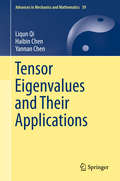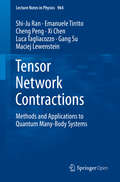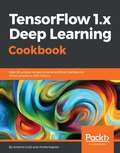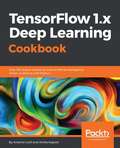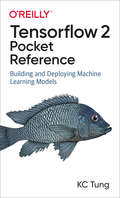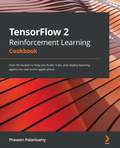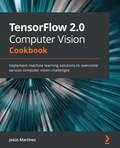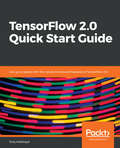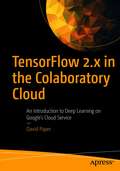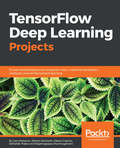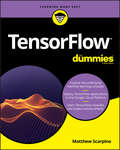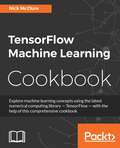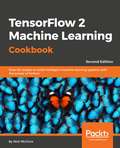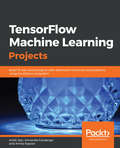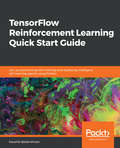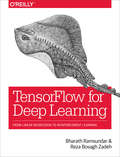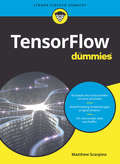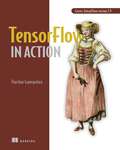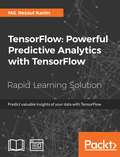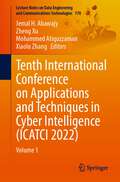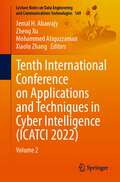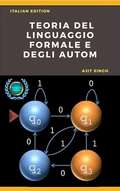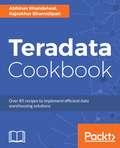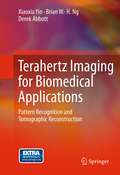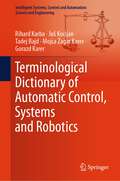- Table View
- List View
Tensor Eigenvalues and Their Applications (Advances in Mechanics and Mathematics #39)
by Liqun Qi Haibin Chen Yannan ChenThis book offers an introduction to applications prompted by tensor analysis, especially by the spectral tensor theory developed in recent years. It covers applications of tensor eigenvalues in multilinear systems, exponential data fitting, tensor complementarity problems, and tensor eigenvalue complementarity problems. It also addresses higher-order diffusion tensor imaging, third-order symmetric and traceless tensors in liquid crystals, piezoelectric tensors, strong ellipticity for elasticity tensors, and higher-order tensors in quantum physics. This book is a valuable reference resource for researchers and graduate students who are interested in applications of tensor eigenvalues.
Tensor Network Contractions: Methods and Applications to Quantum Many-Body Systems (Lecture Notes in Physics #964)
by Xi Chen Gang Su Maciej Lewenstein Shi-Ju Ran Emanuele Tirrito Cheng Peng Luca TagliacozzoTensor network is a fundamental mathematical tool with a huge range of applications in physics, such as condensed matter physics, statistic physics, high energy physics, and quantum information sciences. This open access book aims to explain the tensor network contraction approaches in a systematic way, from the basic definitions to the important applications. This book is also useful to those who apply tensor networks in areas beyond physics, such as machine learning and the big-data analysis. Tensor network originates from the numerical renormalization group approach proposed by K. G. Wilson in 1975. Through a rapid development in the last two decades, tensor network has become a powerful numerical tool that can efficiently simulate a wide range of scientific problems, with particular success in quantum many-body physics. Varieties of tensor network algorithms have been proposed for different problems. However, the connections among different algorithms are not well discussed or reviewed. To fill this gap, this book explains the fundamental concepts and basic ideas that connect and/or unify different strategies of the tensor network contraction algorithms. In addition, some of the recent progresses in dealing with tensor decomposition techniques and quantum simulations are also represented in this book to help the readers to better understand tensor network. This open access book is intended for graduated students, but can also be used as a professional book for researchers in the related fields. To understand most of the contents in the book, only basic knowledge of quantum mechanics and linear algebra is required. In order to fully understand some advanced parts, the reader will need to be familiar with notion of condensed matter physics and quantum information, that however are not necessary to understand the main parts of the book. This book is a good source for non-specialists on quantum physics to understand tensor network algorithms and the related mathematics.
TensorFlow 1.x Deep Learning Cookbook
by Antonio Gulli Amita KapoorTake the next step in implementing various common and not-so-common neural networks with Tensorflow 1.x About This Book • Skill up and implement tricky neural networks using Google's TensorFlow 1.x • An easy-to-follow guide that lets you explore reinforcement learning, GANs, autoencoders, multilayer perceptrons and more. • Hands-on recipes to work with Tensorflow on desktop, mobile, and cloud environment Who This Book Is For This book is intended for data analysts, data scientists, machine learning practitioners and deep learning enthusiasts who want to perform deep learning tasks on a regular basis and are looking for a handy guide they can refer to. People who are slightly familiar with neural networks, and now want to gain expertise in working with different types of neural networks and datasets, will find this book quite useful. What You Will Learn • Install TensorFlow and use it for CPU and GPU operations • Implement DNNs and apply them to solve different AI-driven problems. • Leverage different data sets such as MNIST, CIFAR-10, and Youtube8m with TensorFlow and learn how to access and use them in your code. • Use TensorBoard to understand neural network architectures, optimize the learning process, and peek inside the neural network black box. • Use different regression techniques for prediction and classification problems • Build single and multilayer perceptrons in TensorFlow • Implement CNN and RNN in TensorFlow, and use it to solve real-world use cases. • Learn how restricted Boltzmann Machines can be used to recommend movies. • Understand the implementation of Autoencoders and deep belief networks, and use them for emotion detection. • Master the different reinforcement learning methods to implement game playing agents. • GANs and their implementation using TensorFlow. In Detail Deep neural networks (DNNs) have achieved a lot of success in the field of computer vision, speech recognition, and natural language processing. The entire world is filled with excitement about how deep networks are revolutionizing artificial intelligence. This exciting recipe-based guide will take you from the realm of DNN theory to implementing them practically to solve the real-life problems in artificial intelligence domain. In this book, you will learn how to efficiently use TensorFlow, Google's open source framework for deep learning. You will implement different deep learning networks such as Convolutional Neural Networks (CNNs), Recurrent Neural Networks (RNNs), Deep Q-learning Networks (DQNs), and Generative Adversarial Networks (GANs) with easy to follow independent recipes. You will learn how to make Keras as backend with TensorFlow. With a problem-solution approach, you will understand how to implement different deep neural architectures to carry out complex tasks at work. You will learn the performance of different DNNs on some popularly used data sets such as MNIST, CIFAR-10, Youtube8m, and more. You will not only learn about the different mobile and embedded platforms supported by TensorFlow but also how to set up cloud platforms for deep learning applications. Get a sneak peek of TPU architecture and how they will affect DNN future. By using crisp, no-nonsense recipes, you will become an expert in implementing deep learning techniques in growing real-world applications and research areas such as reinforcement learning, GANs, autoencoders and more. Style and approach This book consists of hands-on recipes where you'll deal with real-world problems. You'll execute a series of tasks as you walk through data mining challenges using TensorFlow 1.x. Your one-stop solution for common and not-so-common pain points, this is a book that you must have on the shelf.
TensorFlow 1.x Deep Learning Cookbook
by Antonio GulliIn this book, you will learn how to efficiently use TensorFlow, Google's open source framework for deep learning. You will implement different deep learning networks such as Convolutional Neural Networks (CNNs), Recurrent Neural Networks (RNNs), Deep Q-learning Networks (DQNs), and Generative Adversarial Networks (GANs) with easy to follow independent recipes.
TensorFlow 2 Pocket Reference: Building and Deploying Machine Learning Models
by Kc TungThis easy-to-use reference for TensorFlow 2 design patterns in Python will help you make informed decisions for various use cases. Author KC Tung addresses common topics and tasks in enterprise data science and machine learning practices rather than focusing on TensorFlow itself.When and why would you feed training data as using NumPy or a streaming dataset? How would you set up cross-validations in the training process? How do you leverage a pretrained model using transfer learning? How do you perform hyperparameter tuning? Pick up this pocket reference and reduce the time you spend searching through options for your TensorFlow use cases.Understand best practices in TensorFlow model patterns and ML workflowsUse code snippets as templates in building TensorFlow models and workflowsSave development time by integrating prebuilt models in TensorFlow HubMake informed design choices about data ingestion, training paradigms, model saving, and inferencingAddress common scenarios such as model design style, data ingestion workflow, model training, and tuning
TensorFlow 2 Reinforcement Learning Cookbook: Over 50 recipes to help you build, train, and deploy learning agents for real-world applications
by Praveen PalanisamyDiscover recipes for developing AI applications to solve a variety of real-world business problems using reinforcement learningKey FeaturesDevelop and deploy deep reinforcement learning-based solutions to production pipelines, products, and servicesExplore popular reinforcement learning algorithms such as Q-learning, SARSA, and the actor-critic methodCustomize and build RL-based applications for performing real-world tasksBook DescriptionWith deep reinforcement learning, you can build intelligent agents, products, and services that can go beyond computer vision or perception to perform actions. TensorFlow 2.x is the latest major release of the most popular deep learning framework used to develop and train deep neural networks (DNNs). This book contains easy-to-follow recipes for leveraging TensorFlow 2.x to develop artificial intelligence applications. Starting with an introduction to the fundamentals of deep reinforcement learning and TensorFlow 2.x, the book covers OpenAI Gym, model-based RL, model-free RL, and how to develop basic agents. You'll discover how to implement advanced deep reinforcement learning algorithms such as actor-critic, deep deterministic policy gradients, deep-Q networks, proximal policy optimization, and deep recurrent Q-networks for training your RL agents. As you advance, you'll explore the applications of reinforcement learning by building cryptocurrency trading agents, stock/share trading agents, and intelligent agents for automating task completion. Finally, you'll find out how to deploy deep reinforcement learning agents to the cloud and build cross-platform apps using TensorFlow 2.x. By the end of this TensorFlow book, you'll have gained a solid understanding of deep reinforcement learning algorithms and their implementations from scratch.What you will learnBuild deep reinforcement learning agents from scratch using the all-new TensorFlow 2.x and Keras APIImplement state-of-the-art deep reinforcement learning algorithms using minimal codeBuild, train, and package deep RL agents for cryptocurrency and stock tradingDeploy RL agents to the cloud and edge to test them by creating desktop, web, and mobile apps and cloud servicesSpeed up agent development using distributed DNN model trainingExplore distributed deep RL architectures and discover opportunities in AIaaS (AI as a Service)Who this book is forThe book is for machine learning application developers, AI and applied AI researchers, data scientists, deep learning practitioners, and students with a basic understanding of reinforcement learning concepts who want to build, train, and deploy their own reinforcement learning systems from scratch using TensorFlow 2.x.
TensorFlow 2.0 Computer Vision Cookbook: Implement machine learning solutions to overcome various computer vision challenges
by Jesus MartinezGet well versed with state-of-the-art techniques to tailor training processes and boost the performance of computer vision models using machine learning and deep learning techniquesKey FeaturesDevelop, train, and use deep learning algorithms for computer vision tasks using TensorFlow 2.xDiscover practical recipes to overcome various challenges faced while building computer vision modelsEnable machines to gain a human level understanding to recognize and analyze digital images and videosBook DescriptionComputer vision is a scientific field that enables machines to identify and process digital images and videos. This book focuses on independent recipes to help you perform various computer vision tasks using TensorFlow. The book begins by taking you through the basics of deep learning for computer vision, along with covering TensorFlow 2.x's key features, such as the Keras and tf.data.Dataset APIs. You'll then learn about the ins and outs of common computer vision tasks, such as image classification, transfer learning, image enhancing and styling, and object detection. The book also covers autoencoders in domains such as inverse image search indexes and image denoising, while offering insights into various architectures used in the recipes, such as convolutional neural networks (CNNs), region-based CNNs (R-CNNs), VGGNet, and You Only Look Once (YOLO). Moving on, you'll discover tips and tricks to solve any problems faced while building various computer vision applications. Finally, you'll delve into more advanced topics such as Generative Adversarial Networks (GANs), video processing, and AutoML, concluding with a section focused on techniques to help you boost the performance of your networks. By the end of this TensorFlow book, you'll be able to confidently tackle a wide range of computer vision problems using TensorFlow 2.x.What you will learnUnderstand how to detect objects using state-of-the-art models such as YOLOv3Use AutoML to predict gender and age from imagesSegment images using different approaches such as FCNs and generative modelsLearn how to improve your network's performance using rank-N accuracy, label smoothing, and test time augmentationEnable machines to recognize people's emotions in videos and real-time streamsAccess and reuse advanced TensorFlow Hub models to perform image classification and object detectionGenerate captions for images using CNNs and RNNsWho this book is forThis book is for computer vision developers and engineers, as well as deep learning practitioners looking for go-to solutions to various problems that commonly arise in computer vision. You will discover how to employ modern machine learning (ML) techniques and deep learning architectures to perform a plethora of computer vision tasks. Basic knowledge of Python programming and computer vision is required.
TensorFlow 2.0 Quick Start Guide: Get up to speed with the newly introduced features of TensorFlow 2.0
by Tony HoldroydPerform supervised and unsupervised machine learning and learn advanced techniques such as training neural networks. Key Features Train your own models for effective prediction, using high-level Keras API Perform supervised and unsupervised machine learning and learn advanced techniques such as training neural networks Get acquainted with some new practices introduced in TensorFlow 2.0 Alpha Book Description TensorFlow is one of the most popular machine learning frameworks in Python. With this book, you will improve your knowledge of some of the latest TensorFlow features and will be able to perform supervised and unsupervised machine learning and also train neural networks. After giving you an overview of what's new in TensorFlow 2.0 Alpha, the book moves on to setting up your machine learning environment using the TensorFlow library. You will perform popular supervised machine learning tasks using techniques such as linear regression, logistic regression, and clustering. You will get familiar with unsupervised learning for autoencoder applications. The book will also show you how to train effective neural networks using straightforward examples in a variety of different domains. By the end of the book, you will have been exposed to a large variety of machine learning and neural network TensorFlow techniques. What you will learn Use tf.Keras for fast prototyping, building, and training deep learning neural network models Easily convert your TensorFlow 1.12 applications to TensorFlow 2.0-compatible files Use TensorFlow to tackle traditional supervised and unsupervised machine learning applications Understand image recognition techniques using TensorFlow Perform neural style transfer for image hybridization using a neural network Code a recurrent neural network in TensorFlow to perform text-style generation Who this book is for Data scientists, machine learning developers, and deep learning enthusiasts looking to quickly get started with TensorFlow 2 will find this book useful. Some Python programming experience with version 3.6 or later, along with a familiarity with Jupyter notebooks will be an added advantage. Exposure to machine learning and neural network techniques would also be helpful.
TensorFlow 2.x in the Colaboratory Cloud: An Introduction to Deep Learning on Google’s Cloud Service
by David PaperUse TensorFlow 2.x with Google's Colaboratory (Colab) product that offers a free cloud service for Python programmers. Colab is especially well suited as a platform for TensorFlow 2.x deep learning applications. You will learn Colab’s default install of the most current TensorFlow 2.x along with Colab’s easy access to on-demand GPU hardware acceleration in the cloud for fast execution of deep learning models. This book offers you the opportunity to grasp deep learning in an applied manner with the only requirement being an Internet connection. Everything else—Python, TensorFlow 2.x, GPU support, and Jupyter Notebooks—is provided and ready to go from Colab. The book begins with an introduction to TensorFlow 2.x and the Google Colab cloud service. You will learn how to provision a workspace on Google Colab and build a simple neural network application. From there you will progress into TensorFlow datasets and building input pipelines in support of modeling and testing. You will find coverage of deep learning classification and regression, with clear code examples showing how to perform each of those functions. Advanced topics covered in the book include convolutional neural networks and recurrent neural networks. This book contains all the applied math and programming you need to master the content. Examples range from simple to relatively complex when necessary to ensure acquisition of appropriate deep learning concepts and constructs. Examples are carefully explained, concise, accurate, and complete to perfectly complement deep learning skill development. Care is taken to walk you through the foundational principles of deep learning through clear examples written in Python that you can try out and experiment with using Google Colab from the comfort of your own home or office.What You Will LearnBe familiar with the basic concepts and constructs of applied deep learningCreate machine learning models with clean and reliable Python codeWork with datasets common to deep learning applicationsPrepare data for TensorFlow consumptionTake advantage of Google Colab’s built-in support for deep learningExecute deep learning experiments using a variety of neural network modelsBe able to mount Google Colab directly to your Google Drive accountVisualize training versus test performance to see model fitWho This Book Is ForReaders who want to learn the highly popular TensorFlow 2.x deep learning platform, those who wish to master deep learning fundamentals that are sometimes skipped over in the rush to be productive, and those looking to build competency with a modern cloud service tool such as Google Colab
TensorFlow Deep Learning Projects: 10 real-world projects on computer vision, machine translation, chatbots, and reinforcement learning
by Alberto Boschetti Luca Massaron Alexey Grigorev Rajalingappaa Shanmugamani Abhishek ThakurLeverage the power of Tensorflow to design deep learning systems for a variety of real-world scenariosKey FeaturesBuild efficient deep learning pipelines using the popular Tensorflow frameworkTrain neural networks such as ConvNets, generative models, and LSTMsIncludes projects related to Computer Vision, stock prediction, chatbots and moreBook DescriptionTensorFlow is one of the most popular frameworks used for machine learning and, more recently, deep learning. It provides a fast and efficient framework for training different kinds of deep learning models, with very high accuracy. This book is your guide to master deep learning with TensorFlow with the help of 10 real-world projects.TensorFlow Deep Learning Projects starts with setting up the right TensorFlow environment for deep learning. Learn to train different types of deep learning models using TensorFlow, including Convolutional Neural Networks, Recurrent Neural Networks, LSTMs, and Generative Adversarial Networks. While doing so, you will build end-to-end deep learning solutions to tackle different real-world problems in image processing, recommendation systems, stock prediction, and building chatbots, to name a few. You will also develop systems that perform machine translation, and use reinforcement learning techniques to play games.By the end of this book, you will have mastered all the concepts of deep learning and their implementation with TensorFlow, and will be able to build and train your own deep learning models with TensorFlow confidently.What you will learnSet up the TensorFlow environment for deep learningConstruct your own ConvNets for effective image processingUse LSTMs for image caption generationForecast stock prediction accurately with an LSTM architectureLearn what semantic matching is by detecting duplicate Quora questionsSet up an AWS instance with TensorFlow to train GANsTrain and set up a chatbot to understand and interpret human inputBuild an AI capable of playing a video game by itself –and win it!Who this book is forThis book is for data scientists, machine learning developers as well as deep learning practitioners, who want to build interesting deep learning projects that leverage the power of Tensorflow. Some understanding of machine learning and deep learning, and familiarity with the TensorFlow framework is all you need to get started with this book.
TensorFlow For Dummies
by Matthew ScarpinoBecome a machine learning pro! Google TensorFlow has become the darling of financial firms and research organizations, but the technology can be intimidating and the learning curve is steep. Luckily, TensorFlow For Dummies is here to offer you a friendly, easy-to-follow book on the subject. Inside, you’ll find out how to write applications with TensorFlow, while also grasping the concepts underlying machine learning—all without ever losing your cool! Machine learning has become ubiquitous in modern society, and its applications include language translation, robotics, handwriting analysis, financial prediction, and image recognition. TensorFlow is Google's preeminent toolset for machine learning, and this hands-on guide makes it easy to understand, even for those without a background in artificial intelligence. Install TensorFlow on your computer Learn the fundamentals of statistical regression and neural networks Visualize the machine learning process with TensorBoard Perform image recognition with convolutional neural networks (CNNs) Analyze sequential data with recurrent neural networks (RNNs) Execute TensorFlow on mobile devices and the Google Cloud Platform (GCP) If you’re a manager or software developer looking to use TensorFlow for machine learning, this is the book you’ll want to have close by.
TensorFlow Machine Learning Cookbook
by Nick McclureExplore machine learning concepts using the latest numerical computing library — TensorFlow — with the help of this comprehensive cookbook About This Book • Your quick guide to implementing TensorFlow in your day-to-day machine learning activities • Learn advanced techniques that bring more accuracy and speed to machine learning • Upgrade your knowledge to the second generation of machine learning with this guide on TensorFlow Who This Book Is For This book is ideal for data scientists who are familiar with C++ or Python and perform machine learning activities on a day-to-day basis. Intermediate and advanced machine learning implementers who need a quick guide they can easily navigate will find it useful. What You Will Learn • Become familiar with the basics of the TensorFlow machine learning library • Get to know Linear Regression techniques with TensorFlow • Learn SVMs with hands-on recipes • Implement neural networks and improve predictions • Apply NLP and sentiment analysis to your data • Master CNN and RNN through practical recipes • Take TensorFlow into production In Detail TensorFlow is an open source software library for Machine Intelligence. The independent recipes in this book will teach you how to use TensorFlow for complex data computations and will let you dig deeper and gain more insights into your data than ever before. You'll work through recipes on training models, model evaluation, sentiment analysis, regression analysis, clustering analysis, artificial neural networks, and deep learning – each using Google's machine learning library TensorFlow. This guide starts with the fundamentals of the TensorFlow library which includes variables, matrices, and various data sources. Moving ahead, you will get hands-on experience with Linear Regression techniques with TensorFlow. The next chapters cover important high-level concepts such as neural networks, CNN, RNN, and NLP. Once you are familiar and comfortable with the TensorFlow ecosystem, the last chapter will show you how to take it to production. Style and approach This book takes a recipe-based approach where every topic is explicated with the help of a real-world example.
TensorFlow Machine Learning Cookbook: Over 60 recipes to build intelligent machine learning systems with the power of Python, 2nd Edition
by Nick McClureSkip the theory and get the most out of Tensorflow to build production-ready machine learning modelsKey FeaturesExploit the features of Tensorflow to build and deploy machine learning modelsTrain neural networks to tackle real-world problems in Computer Vision and NLPHandy techniques to write production-ready code for your Tensorflow modelsBook DescriptionTensorFlow is an open source software library for Machine Intelligence. The independent recipes in this book will teach you how to use TensorFlow for complex data computations and allow you to dig deeper and gain more insights into your data than ever before. With the help of this book, you will work with recipes for training models, model evaluation, sentiment analysis, regression analysis, clustering analysis, artificial neural networks, and more. You will explore RNNs, CNNs, GANs, reinforcement learning, and capsule networks, each using Google's machine learning library, TensorFlow. Through real-world examples, you will get hands-on experience with linear regression techniques with TensorFlow. Once you are familiar and comfortable with the TensorFlow ecosystem, you will be shown how to take it to production.By the end of the book, you will be proficient in the field of machine intelligence using TensorFlow. You will also have good insight into deep learning and be capable of implementing machine learning algorithms in real-world scenarios.What you will learnBecome familiar with the basic features of the TensorFlow libraryGet to know Linear Regression techniques with TensorFlowLearn SVMs with hands-on recipesImplement neural networks to improve predictive modelingApply NLP and sentiment analysis to your dataMaster CNN and RNN through practical recipesImplement the gradient boosted random forest to predict housing pricesTake TensorFlow into productionWho this book is forIf you are a data scientist or a machine learning engineer with some knowledge of linear algebra, statistics, and machine learning, this book is for you. If you want to skip the theory and build production-ready machine learning models using Tensorflow without reading pages and pages of material, this book is for you. Some background in Python programming is assumed.
TensorFlow Machine Learning Projects
by Ankit JainThis book is for data analysts, data scientists, machine learning professionals and developers, and deep learning enthusiasts with basic knowledge of TensorFlow. If you want to build end-to-end projects in machine learning domain this book is what you need! This book appeals for anyone who is looking to go beyond the basics of TensorFlow and want to know how it can be used in various domains.
TensorFlow Reinforcement Learning Quick Start Guide: Get up and running with training and deploying intelligent, self-learning agents using Python
by Kaushik BalakrishnanLeverage the power of Tensorflow to Create powerful software agents that can self-learn to perform real-world tasks Key Features Explore efficient Reinforcement Learning algorithms and code them using TensorFlow and Python Train Reinforcement Learning agents for problems, ranging from computer games to autonomous driving. Formulate and devise selective algorithms and techniques in your applications in no time. Book Description Advances in reinforcement learning algorithms have made it possible to use them for optimal control in several different industrial applications. With this book, you will apply Reinforcement Learning to a range of problems, from computer games to autonomous driving. The book starts by introducing you to essential Reinforcement Learning concepts such as agents, environments, rewards, and advantage functions. You will also master the distinctions between on-policy and off-policy algorithms, as well as model-free and model-based algorithms. You will also learn about several Reinforcement Learning algorithms, such as SARSA, Deep Q-Networks (DQN), Deep Deterministic Policy Gradients (DDPG), Asynchronous Advantage Actor-Critic (A3C), Trust Region Policy Optimization (TRPO), and Proximal Policy Optimization (PPO). The book will also show you how to code these algorithms in TensorFlow and Python and apply them to solve computer games from OpenAI Gym. Finally, you will also learn how to train a car to drive autonomously in the Torcs racing car simulator. By the end of the book, you will be able to design, build, train, and evaluate feed-forward neural networks and convolutional neural networks. You will also have mastered coding state-of-the-art algorithms and also training agents for various control problems. What you will learn Understand the theory and concepts behind modern Reinforcement Learning algorithms Code state-of-the-art Reinforcement Learning algorithms with discrete or continuous actions Develop Reinforcement Learning algorithms and apply them to training agents to play computer games Explore DQN, DDQN, and Dueling architectures to play Atari's Breakout using TensorFlow Use A3C to play CartPole and LunarLander Train an agent to drive a car autonomously in a simulator Who this book is for Data scientists and AI developers who wish to quickly get started with training effective reinforcement learning models in TensorFlow will find this book very useful. Prior knowledge of machine learning and deep learning concepts (as well as exposure to Python programming) will be useful.
TensorFlow for Deep Learning: From Linear Regression to Reinforcement Learning
by Bharath Ramsundar Reza Bosagh ZadehLearn how to solve challenging machine learning problems with TensorFlow, Google’s revolutionary new software library for deep learning. If you have some background in basic linear algebra and calculus, this practical book introduces machine-learning fundamentals by showing you how to design systems capable of detecting objects in images, understanding text, analyzing video, and predicting the properties of potential medicines.TensorFlow for Deep Learning teaches concepts through practical examples and helps you build knowledge of deep learning foundations from the ground up. It’s ideal for practicing developers with experience designing software systems, and useful for scientists and other professionals familiar with scripting but not necessarily with designing learning algorithms.Learn TensorFlow fundamentals, including how to perform basic computationBuild simple learning systems to understand their mathematical foundationsDive into fully connected deep networks used in thousands of applicationsTurn prototypes into high-quality models with hyperparameter optimizationProcess images with convolutional neural networksHandle natural language datasets with recurrent neural networksUse reinforcement learning to solve games such as tic-tac-toeTrain deep networks with hardware including GPUs and tensor processing units
TensorFlow für Dummies (Für Dummies)
by Matthew ScarpinoTensorFlow ist Googles herausragendes Werkzeug für das maschinelle Lernen, und dieses Buch macht es zugänglich, selbst wenn Sie bisher wenig über neuronale Netze und Deep Learning wissen. Sie erfahren, auf welchen Prinzipien TensorFlow basiert und wie Sie mit TensorFlow Anwendungen 1.0 schreiben. Gleichzeitig lernen Sie die Konzepte des maschinellen Lernens kennen. Wenn Sie Softwareentwickler sind und TensorFlow in Zukunft einsetzen möchten, dann ist dieses Buch der richtige Einstieg für Sie. Greifen Sie auch zu, wenn Sie einfach mehr über das maschinelle Lernen erfahren wollen.
TensorFlow in Action
by Thushan GanegedaraUnlock the TensorFlow design secrets behind successful deep learning applications! Deep learning StackOverflow contributor Thushan Ganegedara teaches you the new features of TensorFlow 2 in this hands-on guide.In TensorFlow in Action you will learn: Fundamentals of TensorFlow Implementing deep learning networks Picking a high-level Keras API for model building with confidence Writing comprehensive end-to-end data pipelines Building models for computer vision and natural language processing Utilizing pretrained NLP models Recent algorithms including transformers, attention models, and ElMo In TensorFlow in Action, you'll dig into the newest version of Google's amazing TensorFlow framework as you learn to create incredible deep learning applications. Author Thushan Ganegedara uses quirky stories, practical examples, and behind-the-scenes explanations to demystify concepts otherwise trapped in dense academic papers. As you dive into modern deep learning techniques like transformer and attention models, you&’ll benefit from the unique insights of a top StackOverflow contributor for deep learning and NLP. About the technology Google&’s TensorFlow framework sits at the heart of modern deep learning. Boasting practical features like multi-GPU support, network data visualization, and easy production pipelines using TensorFlow Extended (TFX), TensorFlow provides the most efficient path to professional AI applications. And the Keras library, fully integrated into TensorFlow 2, makes it a snap to build and train even complex models for vision, language, and more. About the book TensorFlow in Action teaches you to construct, train, and deploy deep learning models using TensorFlow 2. In this practical tutorial, you&’ll build reusable skill hands-on as you create production-ready applications such as a French-to-English translator and a neural network that can write fiction. You&’ll appreciate the in-depth explanations that go from DL basics to advanced applications in NLP, image processing, and MLOps, complete with important details that you&’ll return to reference over and over. What's inside Covers TensorFlow 2.9 Recent algorithms including transformers, attention models, and ElMo Build on pretrained models Writing end-to-end data pipelines with TFX About the reader For Python programmers with basic deep learning skills. About the author Thushan Ganegedara is a senior ML engineer at Canva and TensorFlow expert. He holds a PhD in machine learning from the University of Sydney. Table of Contents PART 1 FOUNDATIONS OF TENSORFLOW 2 AND DEEP LEARNING 1 The amazing world of TensorFlow 2 TensorFlow 2 3 Keras and data retrieval in TensorFlow 2 4 Dipping toes in deep learning 5 State-of-the-art in deep learning: Transformers PART 2 LOOK MA, NO HANDS! DEEP NETWORKS IN THE REAL WORLD 6 Teaching machines to see: Image classification with CNNs 7 Teaching machines to see better: Improving CNNs and making them confess 8 Telling things apart: Image segmentation 9 Natural language processing with TensorFlow: Sentiment analysis 10 Natural language processing with TensorFlow: Language modeling PART 3 ADVANCED DEEP NETWORKS FOR COMPLEX PROBLEMS 11 Sequence-to-sequence learning: Part 1 12 Sequence-to-sequence learning: Part 2 13 Transformers 14 TensorBoard: Big brother of TensorFlow 15 TFX: MLOps and deploying models with TensorFlow
TensorFlow: Predict valuable insights of your data with TensorFlow
by Md. Rezaul KarimLearn how to solve real life problems using different methods like logic regression, random forests and SVM’s with TensorFlow.Key FeaturesUnderstand predictive analytics along with its challenges and best practices Embedded with assessments that will help you revise the concepts you have learned in this bookBook DescriptionPredictive analytics discovers hidden patterns from structured and unstructured data for automated decision making in business intelligence. Predictive decisions are becoming a huge trend worldwide, catering to wide industry sectors by predicting which decisions are more likely to give maximum results. TensorFlow, Google’s brainchild, is immensely popular and extensively used for predictive analysis.This book is a quick learning guide on all the three types of machine learning, that is, supervised, unsupervised, and reinforcement learning with TensorFlow. This book will teach you predictive analytics for high-dimensional and sequence data. In particular, you will learn the linear regression model for regression analysis. You will also learn how to use regression for predicting continuous values. You will learn supervised learning algorithms for predictive analytics. You will explore unsupervised learning and clustering using K-meansYou will then learn how to predict neighborhoods using K-means, and then, see another example of clustering audio clips based on their audio features. This book is ideal for developers, data analysts, machine learning practitioners, and deep learning enthusiasts who want to build powerful, robust, and accurate predictive models with the power of TensorFlow. This book is embedded with useful assessments that will help you revise the concepts you have learned in this book.What you will learnLearn TensorFlow features in a real-life problem, followed by detailed TensorFlow installation and configurationExplore computation graphs, data, and programming models also get an insight into an example of implementing linear regression model for predictive analyticsSolve the Titanic survival problem using logistic regression, random forests, and SVMs for predictive analyticsDig deeper into predictive analytics and find out how to take advantage of it to cluster records belonging to the certain group or class for a dataset of unsupervised observationsLearn several examples of how to apply reinforcement learning algorithms for developing predictive models on real-life datasetsWho this book is forThis book is aimed at developers, data analysts, machine learning practitioners, and deep learning enthusiasts who want to build powerful, robust, and accurate predictive models with the power of TensorFlow.
Tenth International Conference on Applications and Techniques in Cyber Intelligence: Volume 1 (Lecture Notes on Data Engineering and Communications Technologies #170)
by Jemal H. Abawajy Xiaolu Zhang Mohammed Atiquzzaman Zheng XuThis book presents innovative ideas, cutting-edge findings, and novel techniques, methods, and applications in a broad range of cybersecurity and cyberthreat intelligence areas. As our society becomes smarter, there is a corresponding need to secure our cyberfuture. The book describes approaches and findings that are of interest to business professionals and governments seeking to secure our data and underpin infrastructures, as well as to individual users.
Tenth International Conference on Applications and Techniques in Cyber Intelligence: Volume 2 (Lecture Notes on Data Engineering and Communications Technologies #169)
by Jemal H. Abawajy Xiaolu Zhang Mohammed Atiquzzaman Zheng XuThis book presents innovative ideas, cutting-edge findings, and novel techniques, methods, and applications in a broad range of cybersecurity and cyberthreat intelligence areas. As our society becomes smarter, there is a corresponding need to secure our cyberfuture. The book describes approaches and findings that are of interest to business professionals and governments seeking to secure our data and underpin infrastructures, as well as to individual users.
Teoria del Linguaggio Formale e degli Automi
by Ajit SinghIl libro contiene una trattazione approfondita di tutti gli argomenti relativi alla teoria del calcolo, come menzionato nei syllabus di B.E., M.C.A. e M.Sc. (Informatica) di varie università. Una quantità sufficiente di input teorici supportati da una serie di illustrazioni sono inclusi per coloro che sono profondamente interessati alla materia. Nei primi capitoli il libro presenta il materiale di base necessario per lo studio delle teorie degli automi. Esempi di argomenti inclusi sono: i linguaggi regolari e il Teorema di Kleene; gli automi minimi e i monoidi sintattici; il rapporto tra linguaggi senza contesto e automi pushdown; le macchine di Turing e la decidibilità. Questo libro facilita agli studenti uno stile di scrittura più informale, fornendo al contempo la copertura più accessibile della teoria degli automi, un trattamento solido sulla costruzione di prove, molte figure e diagrammi per aiutare a trasmettere le idee, e barre laterali per evidenziare il materiale correlato. Ogni capitolo offre un'abbondanza di esercizi per l'apprendimento pratico.
Teradata Cookbook: Over 85 recipes to implement efficient data warehousing solutions
by Abhinav Khandelwal Rajsekhar BhamidipatiData management and analytics simplified with Teradata Key Features Take your understanding of Teradata to the next level and build efficient data warehousing applications for your organization Covers recipes on data handling, warehousing, advanced querying and the administrative tasks in Teradata. Contains practical solutions to tackle common (and not-so-common) problems you might encounter in your day to day activities Book Description Teradata is an enterprise software company that develops and sells its eponymous relational database management system (RDBMS), which is considered to be a leading data warehousing solutions and provides data management solutions for analytics. This book will help you get all the practical information you need for the creation and implementation of your data warehousing solution using Teradata. The book begins with recipes on quickly setting up a development environment so you can work with different types of data structuring and manipulation function. You will tackle all problems related to efficient querying, stored procedure searching, and navigation techniques. Additionally, you’ll master various administrative tasks such as user and security management, workload management, high availability, performance tuning, and monitoring. This book is designed to take you through the best practices of performing the real daily tasks of a Teradata DBA, and will help you tackle any problem you might encounter in the process. What you will learn Understand Teradata's competitive advantage over other RDBMSs. Use SQL to process data stored in Teradata tables. Leverage Teradata’s available application utilities and parallelism to play with large datasets Apply various performance tuning techniques to optimize the queries. Acquire deeper knowledge and understanding of the Teradata Architecture. Easy steps to load, archive, restore data and implement Teradata protection features Gain confidence in running a wide variety of Data analytics and develop applications for the Teradata environment Who this book is for This book is for Database administrator's and Teradata users who are looking for a practical, one-stop resource to solve all their problems while handling their Teradata solution. If you are looking to learn the basic as well as the advanced tasks involved in Teradata querying or administration, this book will be handy. Some knowledge of relational database concepts will be helpful to get the best out of this book.
Terahertz Imaging for Biomedical Applications
by Brian W.-H. Ng Xiaoxia Yin Derek AbbottTerahertz biomedical imaging has become an area of interest due to its ability to simultaneously acquire both image and spectral information. Terahertz imaging systems are being commercialized, with increasing trials performed in a biomedical setting. As a result, advanced digital image processing algorithms are needed to assist screening, diagnosis, and treatment. "Pattern Recognition and Tomographic Reconstruction" presents these necessary algorithms, which will play a critical role in the accurate detection of abnormalities present in biomedical imaging. Terhazertz tomographic imaging and detection technology contributes to the ability to identify opaque objects with clear boundaries, and would be useful to both in vivo and ex vivo environments, making this book a must-read for anyone in the field of biomedical engineering and digital imaging.
Terminological Dictionary of Automatic Control, Systems and Robotics (Intelligent Systems, Control and Automation: Science and Engineering #104)
by Tadej Bajd Juš Kocijan Gorazd Karer Rihard Karba Mojca Žagar KarerThis dictionary contains terms from the fields of automatic control, which includes mathematical modelling, simulation of dynamic systems, automation technology with its corresponding elements, and robotics. It also includes signal processing, information technologies and production technologies.The terminological dictionary is primarily aimed at experts and students who deal with control technology and dynamic systems in both technical and non-technical domains. To be able to use the dictionary, at least basic knowledge in this field is required. In the dictionary users will find concise terminological definitions. A concept may be designated by different terms; therefore, cross-references are used. The aim of the dictionary is to collect and unify – at least to an achievable extent – the terminology in the field of automatic control, dynamic systems and robotics.
